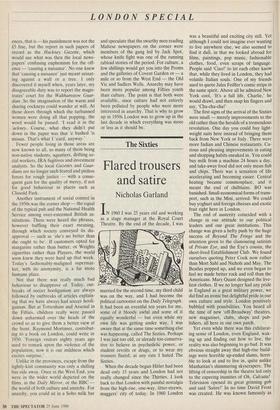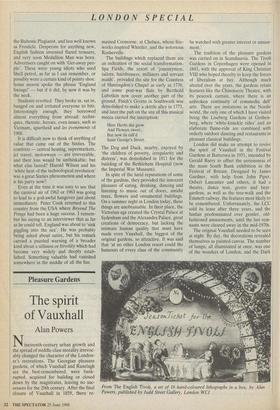The Sixties
Flared trousers and satire
Nicholas Garland
IN 1960 I was 25 years old and working as a stage manager at the Royal Court Theatre. By the end of the decade, I was married for the second time, my third child was on the way, and I had become the political cartoonist on the Daily Telegraph. It had been an eventful ten years for me, some of it bloody awful and some of it equally wonderful — but even while my own life was getting under way, I was aware that at the same time something else was happening, called The Sixties. Perhaps I was just too old, or already too conserva- tive to believe in psychedelic power, or student revolts or drugs, or to wear my trousers flared; at any rate I hated The Sixties.
When the decade began Hitler had been dead only 15 years and London had not really changed since the Thirties. I look back to that London with painful nostalgia from the high-rise, one-way, litter-strewn, muggers' city of today. In 1960 London was a beautiful and exciting city still. Yet although I could not imagine ever wanting to live anywhere else, we also seemed to find it dull, in that we looked abroad for films, paintings, pop music, fashionable clothes, food, even scraps of language. People said 'Ciao!' to let each other know that, while they lived in London, they had volatile Italian souls. One of my friends used to quote Jules Feiffer's comic strips in the same spirit. Above all he admired New York cool, 'It's a full life, Charlie,' he would drawl, and then snap his fingers and say, 'Cha-cha-cha!'
The first signs of the arrival of the Sixties were small — merely improvements to the old rather than the heralds of a tremendous revolution. One day you could buy light- weight suits here instead of bringing them back from New York or Italy. There were more Indian and Chinese restaurants. Cu- rious and pleasing improvements in eating and shopping habits sneaked in. You could buy milk from a machine 24 hours a day, and take-away food did not only mean fish and chips. There was a sensation of life accelerating and becoming easier. Central heating became commonplace, and it meant the end of chilblains. BO was banished. Small economical forms of trans- port, such as the Mini, arrived. We could buy yoghurt and foreign cheeses and exotic fruit right here in London.
The end of austerity coincided with a change in our attitude to our political leaders and our great institutions. This change was given a hefty push by the huge success of Beyond The Fringe and the attention given to the clamouring satirists of Private Eye, and the Eye's cousin, the short-lived Establishment Club. We found ourselves quoting Peter Cook now rather than Mort Sahl and Nichols and May. The Beatles popped up, and we even began to feel we made better rock and roll than the Americans. Mary Quant designed the live- liest clothes. If we no longer had any pride in England as a great military power, we did find an ironic but delightful pride in our own culture and style. London positively bubbled with possibilities. You heard all the time of new 'off-Broadway' theatres, new magazines, clubs, shops and pub- lishers, all here in our own patch.
Yet even while there was this exhilarat- ing sense of London, even England, wak- ing up and finding out how to live, the reality was also beginning to go bad. It was obvious straight away that high-rise build- ings were horrible up-ended slums, horri- ble to look at and to live in, quite unlike Manhattan's shimmering skyscrapers. The lifting of censorship in the theatre led only to the capering inanities of Oh, Calcutta! Television opened its great grinning gob and said 'Satire!' In no time David Frost was created. He was known famously as
LONDON SPECIAL
the Bubonic Plagiarist, and less well known as Frosticle. Desperate for anything new, English fashion invented flared trousers, and very soon Medallion Man was born. Advertisers caught on with 'Get-away peo- ple'. These were young idiots who used Shell petrol, as far as I can remember, or possibly wore a certain kind of pointy shoe. Some moron spoke the phrase 'England Swings!' — but if it did, by now it was by the neck.
Students revolted. They broke in, sat in, banged on and irritated everyone to bits. Interestingly enough, they borrowed almost everything from abroad: techni- ques, rhetoric, heroes, even issues, such as Vietnam, apartheid and les evenements of 1968.
It is difficult now to think of anything of value that came out of the Sixties. The comforts — central heating, supermarkets, jet travel, motorways — are irreversible, and their loss would be unthinkable; but what else lasted? Harold Wilson and his 'white heat of the technological revolution' was a great Sixties phenomenon and where is his party now?
Even at the time it was easy to see that the carnival air of 1962 or 1963 was going to lead to a god-awful hangover just about immediately. Peter Cook returned to this country from the USA where Beyond The Fringe had been a huge success. I remem- ber his saying to an interviewer that as far as he could tell, England was about to 'sink giggling into the sea'. He was probably being asked about satire, but his remark carried a puzzled warning of a broader kind about a silliness or frivolity which had become very widely and deeply estab- lished. Something valuable had vanished somewhere in the middle of all the fun.











































































 Previous page
Previous page